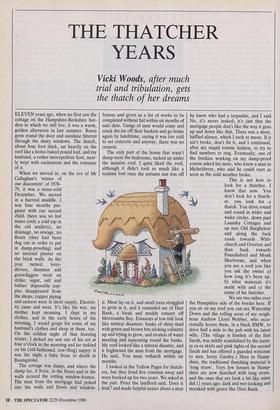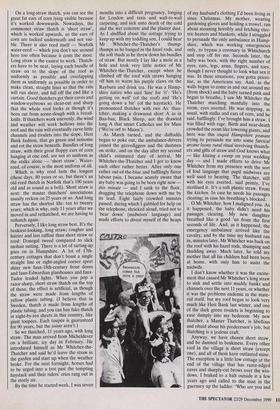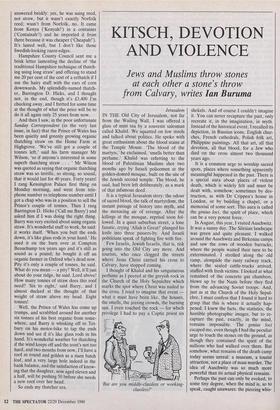THE THATCHER YEARS
Vicki Woods, after much
trial and tribulation, gets the thatch of her dreams
ELEVEN years ago, when we first saw the cottage on the Hampshire-Berkshire bor- ders in which we still live, it was a warm, golden afternoon in late summer. Roses grew round the door and sunshine filtered through the dusty windows. The thatch, about four foot thick, sat heavily on the roof like a home-baked pound loaf, and my husband, a rather metropolitan Scot, near- ly wept with excitement and the romance of it.
The cottage was damp, and where the damp lay, it froze, in the floors and in the walls around the rotting window-frames. The man from the mortgage had poked into the walls and floors and window- frames and given us a list of works to be completed without fail within six months of said date. Gangs of men would come and crack the ice off their buckets and go home again by lunchtime, saying it was too cold to set concrete and anyway, there was no cement.
The only part of the house that wasn't damp were the bedrooms, tucked up under the massive roof. I quite liked the roof, although it didn't look so much like a teatime loaf once the autumn sun was off it. Moss lay on it, and small trees struggled to grow in it, and it reminded me of Hest Bank, a bleak and muddy estuary off Morecambe Bay. Estuaries at low tide look like natural disasters: banks of shiny mud with green and brown bits sticking valiantly up and trying to grow, and rivulets of water meeting and separating round the banks. My roof looked like a natural disaster, and it frightened the man from the mortgage. He said, You must rethatch within six months.
I looked in the Yellow Pages for thatch- ers, but they lived five counties away and were booked up for two years. We asked in the pub. Peter the landlord said, Does it leak? and made helpful noises about a man he knew who had a tarpaulin, and I said No, it's never leaked; it's just that the mortgage people don't like the way it goes up and down like that. There was a short, baffled silence, which I took to mean, If it ain't broke, don't fix it, and I continued, after my stupid townie fashion, to try to find numbers to ring. Eventually, one of the brickies working on my damp-proof course asked his mate, who knew a man in Micheldever, who said he could start as soon as the cold weather broke.
This is not how to look for a thatcher. I know that now. You don't look for a thatch- er, you look for a thatch. You drive round and round in wider and wider circles, down past Laundry Cottages and up into Old Burghclere and along the back roads towards Whit- church and Overton and then back towards Poundisford and Monk Sherborne, and when you see a roof you like you ask the owner a) how long it's been up, b) what materials it's made with and c) the name of his thatcher.
We are two miles over the Hampshire side of the border here. If you sit on my roof you can see Watership Down and the rolling acres of my neigh- bour Andrew Lloyd Webber, who occa- sionally leaves them, in a black BMW, to drive half a mile to the pub with his latest wife. (The village is fondest of the first Sarah, was mildly scandalised by the teent- sy ra-ra skirts and pink tights of the second Sarah and has offered a guarded welcome to nice, horsy Gurdey.) Here in Hamp- shire, the traditional thatching material is `long straw'. Very few houses in Hamp- shire are now thatched with long straw, and the ones that are look a bit like mine did 11 years ago: dark and wet-looking and streaked with green like Hest Bank. On a long-straw thatch, you can see the great fat ears of corn lying visible because it's worked downwards. Nowadays, the commoner straw thatch is 'short straw', which is worked upwards, so the ears of corn are tucked underneath and not visi- ble. There is also reed itself — Norfolk water-reed — which you don't see around here too often because it costs the most. Long straw is the easiest to work. Thatch- ers have to be neat, laying each bundle of straw on to the slope of the roof as uniformly as possible and overlapping them as uniformly as possible in order to make clean, straight lines so that the rain will run sheer, and fall off the end like a curtain. Good thatchers get their eaves and window-eyebrows so clean-cut and sharp that the whole roof looks as though it's been cut from scone-dough with a bread- knife. If thatchers work unevenly, the wind and weather will work hollows into the roof and the rain will eventually carve little channels and rivulets into the slope, Hest Bank fashion, that go green and noisome and rot, the straw beneath. Bundles of long straw, with their great floppy ears of corn hanging at one end, are not so uniform as the stalks alone — 'short straw'. Water- reed, of course, is the most uniform of all. Which is why reed lasts the longest (these days, 80 years or so, but there's an old reed thatch in Norfolk that's 100 years old and as sound as a bell). Short straw is next: the master thatchers' associations usually reckon on 25 years or so. And long straw has the shortest life: ten to twenty years; which is why, only 11 years after we moved in and rethatched, we are having to rethatch again. Perversely, I like long straw best. It's the boskiest-looking, long straw; rougher and hairier and less raffine than short straw or reed: Donegal tweed compared to slick mohair suiting. There is a lot of tarting-up goes on in Hampshire. A lot of 17th- century cottages that don't boast a single straight line or right-angled corner sport shiny new faux-18th-century front doors and faux-Edwardian glasshouses and faux- Tudor leaded lights. When you pop a razor-sharp, short straw thatch on the top of these, the effect is artificial, as though the straw were made from lengths of yellow plastic tubing. (I believe that in Sweden, thatch is made from lengths of plastic tubing, and you can buy fake thatch in eight-by-ten sheets in this country, like giant toupees. Each toupee is guaranteed for 90 years, but the joints aren't.) So we thatched, 11 years ago, with long straw. The man arrived from Micheldever on a brilliant, icy day in February. He introduced himself as Mr Whitcher-the- Thatcher and said he'd leave the straw in the garden and start up when the weather broke. For the next fortnight, horses had to be urged into a trot past the tempting haystack and their riders' cries rang out in the steely air. By the time he started work, I was seven months into a difficult pregnancy, longing for London and taxis and wall-to-wall carpeting, and sick unto death of the cold and the wet concrete and the plaster dust. As I shuffled about the cottage trying to keep up with my toddling son, I could hear Mr Whitcher-the-Thatcher's thump- thumps as he banged in the hazel rods, and the soft thuds as he threw down his bundles of straw. But mostly I lay like a mole in a hole and took very little notice of Mr Whitcher-the-Thatcher, except when he climbed off the roof with straws hanging off him to warm his purple claws on the Rayburn and drink tea. He was a Hamp- shire native who said 'him' for it': 'He's getting on well' (of the roof) and 'He's going down a bit' (of the haystack). He pronounced thatcher with two As: thaa- tcher; making a drawnout short A as in Baa-baa, Black Sheep, not the drawled long A that smart Catholics use for Mass ('We're orf to Maass').
As March turned, and the daffodils began to poke out, the ambulance-drivers joined the gravediggers and the dustmen on strike, and on the day after my second child's estimated date of arrival, Mr Whitcher-the-Thatcher and I got to know each other rather better. After only one rather out-of-the-blue and bafflingly fierce labour pain, I became acutely aware that my baby was going to be born right now this minute — and I sank to the floor, dragging the telephone down with me by its lead. Eight fairly crowded minutes passed, during which I gabbled for help on the telephone, shrieked aloud, tried not to `bear down' (midwives' language) and made efforts to divest myself of the heaps of my husband's clothing I'd been living in since Christmas. My mother, wearing gardening gloves and holding a trowel, ran about moaning horribly and fetching elec- tric heaters and blankets, while I struggled to persuade the only ambulance in Hamp- shire, which was working emergencies only, to bypass a coronary in Whitchurch and stop off for me. Seconds later, the baby was born, with the right number of eyes, ears, legs, arms, fingers, and toes, though I never thought to look what sex it was. In these situations, you gotta priori- tise, as the Americans say. And, as the walls began to come in and out around me (from shock) and the baby turned pink and began to breathe, I saw Mr Whitcher the Thatcher marching manfully into the room, eyes averted. He was dripping, as usual, with stalks and ears of corn, and he said, bafflingly: I've brought him a straw. I was filled with rage. Birth and near-death crowded the room like lowering giants, and here was this stupid Hampshire peasant trying to persuade me into some farcical arcane loony rural ritual involving thaatch- ers and gifts of straw and God knows what — like kissing a sweep on your wedding day — and I made efforts to drive Mr Whitcher from my presence with the sort of foul language that pupil midwives are well used to hearing. The thatcher, still with his eyes averted, said primly, I've sterilised it. It's a soft plastic straw. From the kitchen. In case he needs his passages clearing; in case his breathing's blocked.
0 Mr Whitcher, how I maligned you. As it happened, the baby didn't need his passages clearing. My new daughter breathed like a good 'un from the first seconds of life. And, as it happened, the emergency ambulance arrived like the cavalry, and by the time my husband ran in, minutes later, Mr Whitcher was back on the roof with his hazel rods, thumping and thudding away. Much later, he told my mother that all his children had been born at home, with only him to assist the midwife.
I don't know whether it was the excite- ment that caused Mr Whitcher's long straw to sink and settle into muddy banks and channels over the next 11 years, or whether it was the problems endemic in the mate- rial itself, but my roof began to look very much like Hest Bank last winter, and one of the dark green rivulets is beginning to ease damply into my bedroom. My new thatcher, a Master Thatcher, is libellous and ribald about his predecessor's job, but thatching is a jealous craft.
Anyway, we have chosen short straw, and be damned to boskiness. Every other roof in the village is short straw (except one), and all of them have outlasted mine. The exception is a little low cottage at the end of the village that has razor-edged eaves and sharply-cut brows over the win- dows. I braked to a halt outside it a few years ago and called to the man in the guernsey up the ladder: 'Who are you and answered briskly: yes, he was using reed, not straw, but it wasn't exactly Norfolk reed; wasn't from Norfolk, no. It came from Kenya (`Kenyah!') in a container (`Containahl) and he imported it from there because it was cheaper (`Cheapah!'). It's lasted well, but I don't like those Swedish-looking razor-edges.
Hampshire County Council sent me a brisk letter lamenting the decline of 'the traditional Hampshire technique of thatch- ing using long straw' and offering to stand me 20 per cent of the cost of a rethatch if I use the hairy stuff with the ears of corn downwards. My splendidly-named thatch- er, Barrington D. Hicks, and I thought not, in the end, though it's £3,400 I'm chucking away, and I fretted for some time at the thought of what the price will be to do it all again only 25 years from now.
And then I saw, in the poor unfortunate Sunday Correspondent (in the very last issue, in fact) that the Prince of Wales has been quietly and greenly growing organic thatching straw on the Home Farm at Highgrove. 'We've still got a couple of tonnes left,' said his farm manager Mr Wilson, 'so if anyone's interested in some superb thatching straw . . . ' Mr Wilson was quoted as saying that organic thatching straw was so terrific, so strong, so sound, that it would last for 40 years. Forty years!
I rang Kensington Palace first thing on Monday morning, and went from tele- phone number to telephone number until I got a chap who was in a position to sell the Prince's couple of tonnes. Then I rang Barrington D. Hicks (`Call me Barry') and asked him if I was doing the right thing. Barry was very excited about using organic straw. It's wonderful stuff to work, he said: it works itself. 'When you butt the ends down, it's like glass rods in your hand.' He used it on the barn over at Compton Beauchamp ten years ago and it's still as sound as a pound; he bought it off an organic farmer in Oxford who's dead now.
Pity it's only a couple of tonnes, he said. What do you mean — a pity? Well, it'll just about do your ridge, he said. Lord above!
How many tonnes of straw does this roof need? 'Six to eight,' said Barry, and I almost ducked at the thought of that weight of straw above my head. Eight tonnes!
Well, the Prince of Wales has come up trumps, and scrabbled around for another six tonnes of his best organic from some- where, and Barry is whisking off to Tet- bury on his motor-bike to tap the ends down and see if it's like glass rods in his hand. It's wonderful weather for thatching if the wind keeps off and the trost's not too hard, and two months from now, I'll have a roof as round and golden as a risen batch loaf, and a very large hole indeed in the bank balance, and the satisfaction of know- ing that the daughter, now aged eleven and a half, will be pushing 50 before she needs a new roof over her head.
So ends my thatcher era.




































































































 Previous page
Previous page